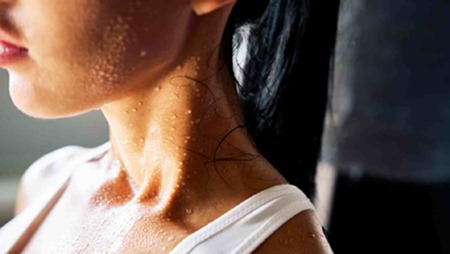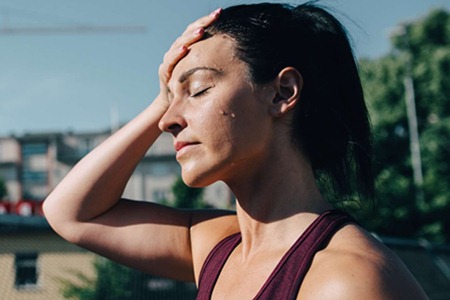Sweating, also known as perspiration, is the body’s natural process of releasing a fluid through sweat glands to regulate temperature and cool down when it gets too hot. Many Individuals believe that sweating helps clear pores and detoxify the skin. In this article, we will dive into whether there is any truth to this common belief.
The Role of Sweat
Sweat is primarily composed of electrolytes, water, and small amounts of waste products like ammonia and urea. Its first purpose is to regulate body temperature by evaporating on the skin’s surface.
While sweat does carry some waste products, its primary function is not to cleanse the pores. The belief that sweating clears pores likely stems from the idea that when sweat reaches the skin’s surface, it can help remove dead skin cells, dirt, and excess oil.
Pores
To understand whether sweating can clean pores, it’s important to know a bit about pores. Pores are small openings in the skin that house sebaceous glands and hair follicles. Sebaceous glands produce sebum, an oily substance that helps protect and moisturize the skin.
When pores become clogged with a combination of dead skin cells, sebum, and external debris, they can lead to skin issues like acne. To address these issues, it’s essential to maintain clean and unclogged pores.
Does Sweating Clear Pores?

Yes, sweating can help clear pores by flushing out debris, dirt, and oil but it’s not a guaranteed method for deep pore cleansing.
While sweat can soften the top layer of skin and make it easier to remove oil and dirt, it doesn’t penetrate deep enough into the pores to cleanse them thoroughly.
For more effective pore-cleansing routine, it’s advisable to exfoliate to remove dead skin cells and cleanse the skin regularly with a gentle cleanser.
In addition to this, maintaining a skincare regimen that includes moisturizing and proper hygiene can help prevent pore clogging.
Benefits of Sweat for Skin
While sweating may not be a direct pore-cleansing method, it does provides other benefits for the skin. Sweating can temporarily improve blood flow to the skin, delivering oxygen and essential nutrients. It can also help reduce stress, which, in turn, may enhance the skin’s overall appearance. However, excessive sweating without proper skin care can cause other issues like skin irritation or clogged sweat glands. Therefore, skincare and maintaining a balanced approach to sweat is crucial for healthy skin.
More
How does sweating affect the size of pores?
Sweating temporarily enlarges pores due to sweat production and increased sebum, but once sweat dries, pores typically return to their normal size.
Are there skincare products to prevent clogged pores from sweating?
Yes, there are skincare products like cleansers and oil-free moisturizers that can help prevent clogged pores from sweating.
Can excessive sweating lead to enlarged pores?
Excessive sweating itself doesn’t directly cause enlarged pores, but it can contribute to clogged pores, which may then appear larger.
Should I cleanse my face immediately after sweating to prevent pore congestion?
Yes, cleansing your face after sweating can help prevent clogged pores and pore congestion.
Are there any specific skincare routines for minimizing pore issues caused by sweating?
Yes, specific skincare routines for minimizing pore issues caused by sweating often involve using non-comedogenic products, cleansing after sweating, and incorporating exfoliation to keep pores clear.
Can sweating exacerbate existing pore-related skin conditions?
Yes, sweating can exacerbate existing pore-related skin conditions like blackheads or acne by increasing sebum production and potentially clogging pores further.
Are there natural remedies to help with pore concerns related to sweating?
Natural remedies for pore concerns related to sweating include using ingredients like aloe vera, clay masks, witch hazel, and apple cider vinegar. These can help tighten and cleanse the skin, reduce excess oil, and minimize the appearance of pores, but results may vary among individuals.
How can I maximize the pore-cleansing effects of sweat?
To maximize pore-cleansing effects of sweat, cleanse your face before sweating to remove dirt and makeup, engage in activities that induce sweating (like sauna or exercise ), and promptly cleanse your face after sweating to remove impurities and sweat, preventing pore congestion.
What happens to pores when sweat mixes with dirt and oils?
When sweat mixes with oils ând dirt on the skin’s surface, it can lead to clogged pores. This mixture can trap bacteria, debris, and dead skin cells within the pores, potentially causing blackheads, acne, or enlarged pores.
Can sweat cause clogged pores, or does it actually clear them?
Sweat itself doesn’t directly clear clogged pores. While it can help to some extent by flushing out some impurities, it can also mix with dead skin cells, dirt, and oils on the skin’s surface, potentially contributing to clogged pores if not cleansed properly.
Conclusion
Sweating is a natural bodily function with various benefits for the body, including temporarily increasing blood flow to the skin and cooling it down. While sweat can help soften the surface of the skin and make it easier to cleanse, it is not a direct method for clearing pores. To maintain healthy and clear skin, it’s important to adopt a comprehensive skincare routine that includes regular exfoliation and cleansing.


